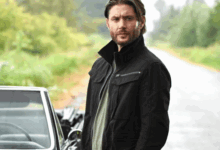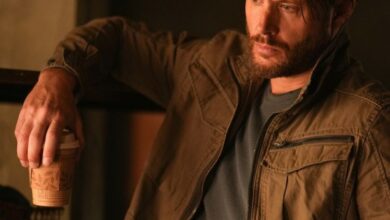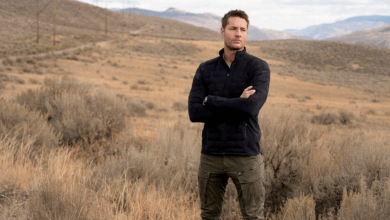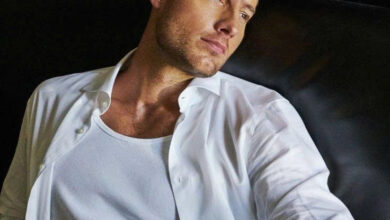The Real Reason Justin Hartley & Jensen Ackles’ Scenes Feel So Intense in “Tracker”
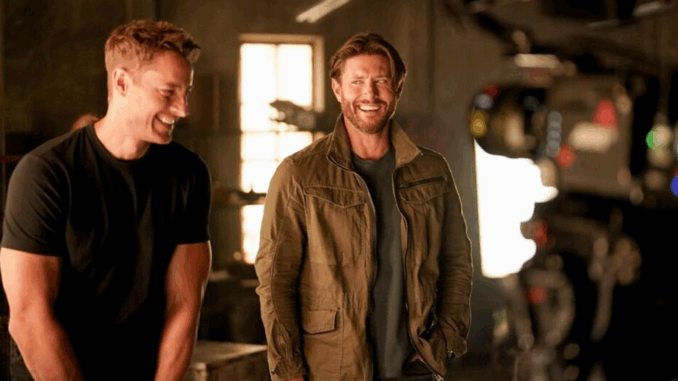
When two powerhouse actors like Justin Hartley and Jensen Ackles share the screen, you can expect sparks to fly. But in Tracker (2024), their chemistry transcends the usual on-screen brotherhood—it’s raw, subtle, and undeniably magnetic. According to showrunner Elwood Reid, what makes their dynamic so gripping is not the words they say, but the ones they choose not to.
Let’s dive into how Hartley and Ackles crafted some of television’s most emotionally charged scenes, why fans can’t stop talking about their tension-filled moments, and how their real-life camaraderie shaped the emotional heartbeat of Tracker.
The Power Duo That Redefined Brotherhood
When Tracker introduced Jensen Ackles as Russell Shaw, the estranged brother of Justin Hartley’s Colter Shaw, the fandom exploded. Both actors came from massive TV successes—Hartley from This Is Us and Ackles from Supernatural—but Tracker offered something new: a grounded, emotionally complex relationship that blended pain, loyalty, and regret.
The way they portrayed brothers with conflicting morals and unresolved trauma felt almost too real. Reid credits their natural rapport for creating that authenticity.
“They don’t need to overact,” Reid said. “A glance, a sigh, a shift in tone—those are enough to tell the story.”
A Lesson in Less: Why Dialogue Was Cut
In an era when TV scripts often rely on heavy exposition, Hartley and Ackles took the opposite route. Many of their most powerful moments were written with fewer lines, forcing the audience to focus on emotion rather than explanation.
Elwood Reid shared that the pair often requested script cuts—removing unnecessary dialogue to let the silence do the talking.
“They understood that sometimes words get in the way of truth,” Reid explained.
This technique gave Tracker a cinematic feel, allowing body language, eye contact, and subtle gestures to replace conventional exchanges. Fans quickly noticed, praising how real their brotherly tension felt.
Behind the Scenes: Mutual Respect and Shared Vision
Both Hartley and Ackles are known for their dedication and professionalism. But what truly sets them apart is their mutual respect. Sources from the set describe their dynamic as “easygoing but deeply focused.” They often rehearse quietly, fine-tuning emotional beats rather than just memorizing lines.
Their collaboration is built on trust. When Ackles improvises a reaction, Hartley adapts in real time, making every take feel spontaneous. That synergy elevates even the simplest interactions into emotional fireworks.
When Silence Becomes the Dialogue
In Tracker, one of the standout scenes between Colter and Russell unfolds in a dimly lit trailer. The two men sit across from each other—no yelling, no dramatic score. Just silence, tension, and years of unspoken pain.
That’s the magic Reid was talking about. The absence of words becomes the most powerful dialogue of all.
It’s storytelling stripped to its core—a masterclass in emotional restraint.
Shared Experience: From Heroes to Haunted Men
What makes Hartley and Ackles’ partnership work so well is their shared experience playing layered, morally gray heroes. Hartley’s Colter is a man on the run from both justice and his past. Ackles’ Russell, meanwhile, is a mirror image—haunted, proud, and searching for redemption.
Their characters’ emotional duality mirrors their acting strengths: Hartley brings vulnerability, Ackles adds gravitas. Together, they balance heart and intensity in perfect measure.
Elwood Reid’s Creative Direction: Tension Over Talk
Reid wanted Tracker to stand apart from formulaic procedural dramas. His direction to Hartley and Ackles was simple yet profound: “Say less. Feel more.”
This minimalist approach makes every glance meaningful. Every pause speaks volumes. And every scene feels alive with tension.
It’s a bold creative choice that risks alienating casual viewers—but for fans who crave emotional depth, it’s pure gold.
The Actors’ Shared Language of Trust
Acting isn’t just about performing—it’s about connection. And Hartley and Ackles share an unspoken language on set. They can read each other’s rhythms, know when to push and when to pull back. That intuitive understanding makes their on-screen relationship believable, even when the dialogue is sparse.
It’s the kind of chemistry you can’t fake—it either exists or it doesn’t. And in Tracker, it shines brighter than ever.
Behind the Camera: Off-Screen Friendship Fuels On-Screen Fire
Off set, both actors share a strong bond. They often joke between takes, discuss scene motivation, and share stories from past projects. This friendship translates directly into their performances.
In interviews, Ackles admitted that working with Hartley felt “refreshingly easy,” while Hartley described Ackles as “a natural partner in emotional storytelling.”
That off-screen respect fuels every on-screen confrontation, turning even brief exchanges into unforgettable moments.
Cinematic Techniques That Amplify Their Chemistry
The Tracker crew uses lighting, framing, and close-ups to emphasize the emotional gravity of Colter and Russell’s scenes. Tight shots capture micro-expressions—twitches, eye shifts, clenched jaws—that reveal more than words ever could.
Reid’s camera work acts like a silent observer, letting the actors’ chemistry unfold naturally without interference. The result? Intimacy that feels almost intrusive, as though the audience is eavesdropping on something deeply personal.
Fans’ Reaction: Emotional Rollercoaster
Social media exploded after the brothers’ reunion aired. Fans flooded X (formerly Twitter) with reactions like, “I felt that silence in my soul,” and “Hartley and Ackles should win awards for that stare-down alone.”
The fan community now eagerly awaits every new episode, dissecting each glance and line for hidden meanings.
Awards Buzz and Critical Acclaim
Industry insiders are already whispering about Emmy buzz for Tracker’s second and third seasons. Critics have praised Hartley and Ackles for “reviving the lost art of emotional subtlety” in network television.
Their ability to make silence speak volumes might just redefine what acting excellence looks like in the procedural drama space.
Emotional Realism: Why Viewers Relate So Deeply
What makes their performances resonate isn’t just skill—it’s authenticity. Viewers see their own fractured family relationships reflected in Colter and Russell’s struggle. Their restrained approach feels human, not performative.
Hartley and Ackles remind us that sometimes love and resentment coexist—and that real connection isn’t about grand speeches but about shared silence.
Future Teases: What’s Next for the Shaw Brothers?
According to insider reports, Tracker Season 3 will further explore the brothers’ backstory, revealing what tore them apart and whether redemption is still possible. Reid hinted that the pair’s on-screen relationship will “evolve from confrontation to fragile cooperation.”
If Season 2 was about anger, Season 3 might be about forgiveness.
The Legacy of Hartley & Ackles’ Collaboration
Few TV pairings capture lightning in a bottle like this one. Hartley and Ackles’ ability to convey complex emotions with restraint sets a new benchmark for modern drama. Their performances aren’t loud—they’re alive.
It’s rare to find actors who can make silence roar, but Hartley and Ackles do it effortlessly.
Conclusion: When Talent Meets Trust
The on-set dynamics between Justin Hartley and Jensen Ackles on Tracker prove that the most powerful performances come from connection, not competition. Their respect for each other and for the story shines through every frame.
By choosing authenticity over dialogue, they’ve created something rare—television that doesn’t just entertain, but moves people. And that’s the mark of true artistry.
FAQs
1. What makes the chemistry between Justin Hartley and Jensen Ackles so unique?
Their chemistry stems from mutual trust, emotional intelligence, and a shared understanding of subtle performance.
2. Did they know each other before working on Tracker?
While they weren’t close before, their mutual respect for each other’s work helped them connect quickly on set.
3. Why did Elwood Reid cut so much dialogue from their scenes?
Reid wanted tension and realism—allowing the actors’ emotions and silence to convey more meaning than words.
4. Will Hartley and Ackles’ characters reconcile in future seasons?
Hints from the showrunner suggest a gradual path toward forgiveness, but with plenty of emotional conflict ahead.
5. Could Tracker win awards for its acting performances?
Many critics believe so—especially if the upcoming season maintains its emotional depth and authenticity.


